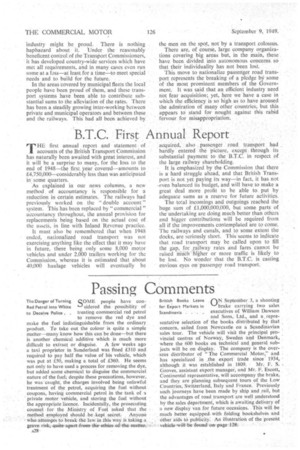B.T.C. First Annual Report
Page 30

If you've noticed an error in this article please click here to report it so we can fix it.
THE first annual report and statement of accounts of the British Transport Commission has naturally been awaited with great interest, and it will be a surprise to many, for the loss to the end of 1948—the first. year covered—amounts to £4,750,000—considerably less than was anticipated in some quarters.
As explained in our news columns, a new method of accountancy is responsible for a reduction in certain estimates. The railways had previously worked on the "double account" system. This has been replaced by " commercial " accountancy throughout, the annual provision for replacements being based on the actual cost of the assets, in line with Inland Revenue practice.
It must also be remembered that when 1948 ended, nationalized road transport was not exercising anything like the effect that it may have in future, there being only some 8,000 motor vehicles and under 2,000 trailers working for the Commission, whereas it is estimated that about 40,000 haulage vehicles will eventually be • acquired, also passenger road transport had hardly entered the Picture, except through its substantial payment to the B.T.C. in respect of the large railway shareholding.
It is emphasized by the Commission that there is Er hard struggle ahead, and that British Transport is not yet paying its way—in fact, it has not even balanced its budget, and will have to make a great deal more profit to be able to put by adequate sums as a reserve for future activities.
The total incomings and outgoings reached the huge sum of £1,000,000,000, but some parts of the undertaking are doing much better than others and bigger contributions will be required from all if the improvements contemplated are to come. The railways and canals, and to some extent the docks, are seriously short. This seems to indicate that road transport may be called upon to fill the gap, for railway rates and fares cannot be raised Much higher or more traffic is likely to be lost. No wonder that the B.T.C. is casting envious eyes on passenger road transport.




























































































